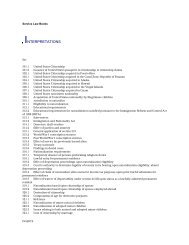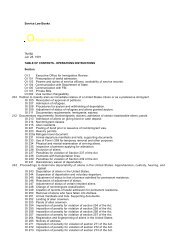Create successful ePaper yourself
Turn your PDF publications into a flip-book with our unique Google optimized e-Paper software.
<strong>Inspector's</strong> <strong>Field</strong> <strong>Manual</strong><br />
forms collected by carrier personnel (or, at land borders directly by the Service) must be promptly routed for<br />
data entry to the Service contractor. See handling procedures in Chapters 21.8 (land), 22.7 (airport), and 23.4<br />
(seaport).<br />
15.2 Passports.<br />
Except where specifically exempted, each arriving nonimmigrant must present a valid passport. Generally, a<br />
passport (defined in section 101(a)(30) of the Act) must be valid for 6 months beyond the period of initial<br />
admission [See section 212(a)(7)(B) of the Act and 8 CFR 214.1(a)(3).]. There are a number of countries with<br />
which the Department of State has concluded agreements providing for return of the holder to his or her country<br />
of origin up to 6 months beyond the nominal expiration date of the passport. If a country is listed on this<br />
"6-month" list, his or her passport needs to be valid only until the date to which the alien is being admitted. The<br />
"6-month" list is contained in Appendix 15.2. General passport requirements and exceptions are discussed in 8<br />
CFR 212.1 and 22 CFR 41.1.<br />
In addition to determining the validity of each passport presented, you must inspect the document to determine<br />
if it has been altered through data eradication, photo substitution, page substitution, or counterfeiting. The<br />
Service makes available various passport studies to assist you in this process. These should be available at<br />
ports-of-entry for your reference. Instances of passport fraud often occur in batches. Thorough examination of<br />
each document is not possible in the time allocated for primary inspection. Use local port intelligence for trends<br />
to assist you in focusing on documents with a high probability of fraud.<br />
Ordinarily, Service officers may endorse the passport of a nonimmigrant applicant for admission only with the<br />
admission stamp and specifically authorized notations such as those specified in Chapter 15.3(d), or notations<br />
which cancel a visa, when INS officers are specifically empowered to do so. Additional unauthorized passport<br />
notations must be avoided.<br />
15.3 Visas.<br />
(a) General. With certain exceptions, each arriving nonimmigrant must present a valid visa. The exceptions are<br />
specified in 8 CFR 212.1 and 22 CFR 41.1 and discussed below. As with passports, you must examine each visa<br />
for alteration, photo substitution, or page substitution. There are several styles of nonimmigrant visas currently<br />
in circulation. Most common are the red, green, and blue "Burroughs-style" visas and the newer<br />
Machine-Readable Visa (MRV). Visas issued by most consular posts indicate "bearer(s)" while those at high<br />
fraud posts will specify the name of the person to whom the visa was issued. The INS Intelligence Office<br />
periodically releases document alerts to help identify genuine visas as well as recently encountered counterfeit<br />
and altered visas. These should be readily available at ports-of-entry for reference. Refer to Chapter 32 for a<br />
detailed description of available intelligence services. Appendix 15-6 includes a list of consular posts and the<br />
dates on which they converted to the MRV format.<br />
(b) Automatic revalidation. Some nonimmigrants reentering the U.S. from Canada or Mexico (and, for students<br />
(F) and exchange visitors (J) and their dependents, adjacent islands except Cuba) after an absence of 30 days or<br />
less are eligible for automatic revalidation of their visas under certain circumstances. Specific requirements and<br />
restrictions are outlined in 8 CFR 214.1 and 22 CFR 41.112. A nonimmigrant readmitted pursuant to this<br />
provision need not be given a new I-94 since he or she will still have the unexpired original. If an F or J alien<br />
otherwise eligible for readmission under this provision does not have his or her original I-94, prepare a new I-94<br />
but insert the original admission number (from Form I-20) on any F-1 readmission.<br />
(c) Valid visa in expired passport. An applicant for admission may use a valid visa in an expired passport,<br />
provided he or she also presents a valid passport. The new, valid travel document need not be issued by the<br />
same authority which issued the document containing the valid visa. For example, an alien may present an<br />
expired Hong Kong Certificate of Identity with a valid nonimmigrant visa plus a valid Hong Kong Special<br />
Administrative Region passport. See 22 CFR 41.112.<br />
(d) Admission procedures. Nonimmigrant visas may be issued for single entry, a specified number of entries or<br />
multiple entries during the period of validity. Upon admission of single or specially limited entry visas, place




